Meet The Hippocampus
Named for its resemblance to the seahorse (from the Greek “hippos” for horse and “kampos” for sea monster), the hippocampus is a vital component of the limbic system. You have a hippocampus in each hemisphere of the brain.
Memory
The hippocampus is most frequently associated with memory. And indeed, it is critically involved in consolidating semantic (information about facts) memories. But the brain has multiple memory systems and the hippocampus is not involved in all of them. Have you ever had the experience of a great idea of yours being attributed to someone else? You recommend a new restaurant and suggest your friends meet there. Everyone finds the location and arrives on time, but someone else in the group is credited with the discovery. Why?! The semantic memory – details like the address, reservation date and time – is consolidated in the hippocampus. But the memory of how the idea was raised in the first place – the autobiographical memory of when and how everyone first learned of the restaurant – is tagged and stored in a more widely distributed way. The more salient details of the plan can override the source of the recommendation. Don’t feel bad; it’s the hippocampus doing what it’s supposed to.
Your Internal GPS
Spatial memory and navigation is another key job of the hippocampus. Those of us who know someone who suffers from Alzheimer’s disease will recognize that two of the early symptoms of the disease are disorientation and a tendency to get lost in familiar places. Plaques and tangles – destructive to neurons and their connections – tend to first develop in the hippocampus. Not only is navigation affected, but also a more fundamental sense of self is altered. Specialized place cells in the hippocampus are important in proprioception – the sense that keeps track of the location of the body and all its parts. Without a fully integrated sense of proprioception, we lose our sense of self and of our connectedness to the world and others around us.
Growing New Neurons (aka Neurogenesis)
Hope springs eternal! While no one has ever found the fountain of youth, scientists have discovered the next best thing: neurogenesis. It was long thought that the brain could not grow replacement parts (brain cells) so loss of neurons due to damage or disease was considered irreversible. But this view was dramatically altered by research published in 1998 providing evidence of neurogenesis in the hippocampus. New brain cells can take over the function of damaged cells and can also support learning. Importantly, we have some control over our brain’s ability to grow new neurons. Neurogenesis is stimulated by exercise, enriched environments and learning. That’s right, learning is both the cause and the effect of new brain cells!
How is iLs involved?
iLs’ Focus Systems provide important contributions to both increasing neuronal connections and growing new brain cells. The music and movement raise physiological and nervous system activity and signal your body to produce BDNF (a protein important for triggering brain cell growth). Many of the Playbook activities keep your vestibular and proprioceptive senses stimulated. And the sustained attention and effort needed to complete a session help to strengthen neural connections.




 © 2025 Unyte Health US Inc.
© 2025 Unyte Health US Inc.